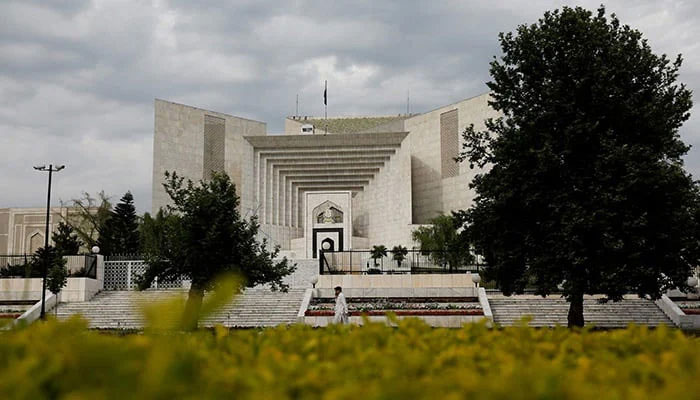A day at the cat cafe
In one university (in Karachi), the statutory positions of controller, registrar, and treasurer have not been filled since November 2022
Many of the world’s big destination cities have a cultural, theatre, or entertainment district. The closest thing Islamabad has is Lok Virsa, where I sometimes take nieces and nephews.
For myself, when I feel like watching live drama, I sit in on proceedings of the Supreme Court of Pakistan on days when there is a hearing for an interesting case. Last Friday was the fourth hearing of a case brought by the All-Public Universities BPS Teachers Association (APUBTA) against The Federation of Pakistan (through the secretary for federal education secretary and professional training, Islamabad and others). The case was heard by a three-member bench of the SC, including the chief justice of Pakistan (CJP). The APUBTA seeks permanent appointments to key offices in universities that are holding up business.
The reason the case was brought before the SC was that as of March of this year, only 57 per cent of the 154 public universities nationwide were operating with permanently appointed VCs. Many also have no appointments to the three most important statutory positions – registrar, treasurer, and controller. The court’s stated goal of the hearings was to ensure universities complied with the law and their acts, statutes, and rules because education is a matter of public interest, funded by taxpayers’ money, that ought to be secured.
In its first order in April, the court had solicited a simple status report of vacancies at public universities. By the time of the second hearing in May, the government had not complied with the court’s order to provide this data, and directions were given more forcefully. By the third hearing in August, government representatives were able to partially comply with the court’s order to provide a simple accounting of existing vacancies.
I was expecting to witness some drama but instead, the experience felt more like visiting a cat cafe. For much of the time, what I saw were senior government officials and vice-chancellors being meek cats. The government respondents, some of whom I witnessed thundering at and unloading on senior staff members of a public university just a few days earlier, were behaving like well-behaved kitties while addressing the court. In sharp contrast to a few days earlier, they also appeared remarkably aware of the limits of their authority. That day being the fourth hearing, the court had summoned VCs and representatives of several universities involved in the matter.
The conduct of various VCs in the court followed the same template as the government representatives. Most of them and their lawyers’ demeanour was as you would expect: deferential, respectful, and polite. Officials of about two dozen universities were summoned by the court that day. All suffered from similar issues, but a few stood out, nevertheless.
In one university (in Karachi), the statutory positions of controller, registrar, and treasurer have not been filled since November 2022. The VC’s explanation for why he has not made appointments in the six months since he took office was that he was waiting on guidance on whether to select from an applicant pool from 2019 or required “permission” to re-advertise the openings from the governing body. My, such helplessness! These are the kinds of decisions that have some university leaders stumped for months.
According to the Higher Education Commission (HEC) and Ministry of Federal Education and Professional Training (MoFEPT), the VC of another institution (in Multan) was appointed in 2012, completed his tenure, and was granted a two-year extension, but was then terminated in 2017 during that extension period.
Instead of vacating the office, he has been illegally occupying the VC office to date – for an additional seven years, almost twice as long as two regular tenures. How, you may ask, is that possible? Simply, by refusing to call a meeting of the university senate that could remove him from his position. This simple maneuver, which could have sprung from the mind of a five-year-old, has the HEC, the MoFEPT, and indeed the entire machinery of government stumped. And people still say that our universities do not have anything worthwhile to teach! Senior employees of government services of all stripes who seek an extension of their appointments ought to learn from this ingenuity.
Among university officials that appeared before the court, there was one exception, the International Islamic University Islamabad (IIUI), whose lawyer took a notably different approach to responding to the court – confrontation. The IIUI's status as a public-sector university is well-established. The IIUI collects approximately Rs3.7 billion from tuition fees and receives Rs0.68 billion from Saudi and Kuwaiti sources. In addition, it also receives more than Rs2.2 billion from the government of Pakistan, more than three times that of foreign sources and more than what most public universities receive.
That did not dissuade the IIUI’s lawyer from arguing that his client university is not a public university and hence not answerable to the court, as if the IIUI is built 10 miles outside of Pakistan. Irrespective of the IIUI’s official status as a private or a public university, it is the recipient of substantial financial support in the form of public funds – taxpayer money. When a university relies on public funds for 40 per cent of its expenses, it is accountable to the public for its performance.
The IIUI’s lawyer persisted in his claim that his client is not a public university and, therefore, not answerable. When that did not work, he demanded the CJP recuse himself from the case because he is a member of the university’s board of trustees. None of these maneuvers helped placate the court’s displeasure with this respondent.
According to the HEC, the IIUI’s rector has made it a habit to not show up for any meetings when invited, citing illness. I would probably feel sick too if the organization I was responsible for had a pension fund running short by Rs11.5 billion (according to an actuarial study) while running a budget deficit.
The HEC also complained that the IIUI is not willing to share any information about its 55 tenured positions of deans, chairpersons, and DGs. Moreover, the university’s board of trustees (required to meet at least once a year) did not meet all of 2021 and 2022. There was a meeting on December 11, 2023, but its minutes were never issued. Similarly, the university’s board of governors (required to meet every quarter) has not met since September 2023.
When the court insisted on the rector’s appearance before the court, it was first offered the same excuse of illness, then a medical certificate of questionable veracity. When the court insisted, the rector made a dramatic appearance in a wheelchair, with sympathetic social media ‘influencers’ in tow. In the meantime, their lawyer was attempting to fabricate a controversy at the expense of the personal safety of the CJP.
The day’s first-hand experiences were also instructive for another reason: It evaporated what little trust I had left in self-styled social media journalists, including some that enjoy reputations of being objective. As soon as the IIUI’s rector left, there were posts up on Twitter / X decrying the court and sympathizing with the rector. Mostly, the reporting was high on emotion but free of objective facts that any serious reporter available in relevant public domain documents. In fact, most of the people doing the reporting on social media platforms later were only in the courtroom briefly, if at all. That did not stop several of them from vigorously stirring the pot on Twitter later in the day.
Several times during the proceedings, the CJP was exasperated to the point where he had to ask attendees why the court had to make government departments and universities do their routine jobs and exclaimed that no one seemed interested in performing their duty.
The MoFEPT, which has been seen eager to relegate the HEC to the role of one of its constituent departments in recent years, was feebly acknowledging the limits of its mandate. The HEC’s representative was professing his inability to answer the court’s questions for lack of responsiveness of universities. On any other day, both MoFEPT and HEC can always be found eager to expand their turf, but not that day.
The story of all public organizations in Pakistan is the same – everyone wants to grow their sphere of influence but not be held responsible for their performance (or the lack thereof).
The writer (she/her) has a PhD in Education.
-
 Cardi B Finally Responds To Accusations About Destroying 'SNL' Set After Nicki Minaj Joke
Cardi B Finally Responds To Accusations About Destroying 'SNL' Set After Nicki Minaj Joke -
 Gorton And Denton By-election Result: Green Party Defeats Labour In Blow To Keir Starmer
Gorton And Denton By-election Result: Green Party Defeats Labour In Blow To Keir Starmer -
 Jack Dorsey Cuts 4,000 Roles, Says AI Requires Smaller Teams
Jack Dorsey Cuts 4,000 Roles, Says AI Requires Smaller Teams -
 Reggie Bannister Health Takes ‘difficult Turn’ Amid Dementia, Parkinson’s Battle
Reggie Bannister Health Takes ‘difficult Turn’ Amid Dementia, Parkinson’s Battle -
 'Humble Traitor' Rob Rausch Makes Unexpected Move After Betraying Maura Higgins In Season 4
'Humble Traitor' Rob Rausch Makes Unexpected Move After Betraying Maura Higgins In Season 4 -
 Sarah Ferguson Drops An Accusation Against Andrew? ‘He Just Wants Leverage’
Sarah Ferguson Drops An Accusation Against Andrew? ‘He Just Wants Leverage’ -
 Anthropic Rejects Pentagon Military AI Proposal, Holds Firm On Safety Guardrails —What’s Next?
Anthropic Rejects Pentagon Military AI Proposal, Holds Firm On Safety Guardrails —What’s Next? -
 'Traitors' Reunion Drama: Rob Rausch Defends Strategy, Makes Shocking Revelation After Victory
'Traitors' Reunion Drama: Rob Rausch Defends Strategy, Makes Shocking Revelation After Victory -
 Inside Hillary Clinton’s Epstein Testimony: Key Takeaways And Highlights Explained
Inside Hillary Clinton’s Epstein Testimony: Key Takeaways And Highlights Explained -
 'Too Hard To Be Without’: Woman Testifies Against Instagram And YouTube
'Too Hard To Be Without’: Woman Testifies Against Instagram And YouTube -
 Kendall Jenner Recalls Being ‘too Stressed’: 'I Want To Focus On Myself'
Kendall Jenner Recalls Being ‘too Stressed’: 'I Want To Focus On Myself' -
 Ethel Kennedy’s 34 Grandchildren And The Expanding Kennedy Family Legacy
Ethel Kennedy’s 34 Grandchildren And The Expanding Kennedy Family Legacy -
 Dolly Parton Achieves Major Milestone For Children's Health Advocacy
Dolly Parton Achieves Major Milestone For Children's Health Advocacy -
 'The White Lotus' Creator Mike White Calls 'Survivor' Fans 'sadistic'
'The White Lotus' Creator Mike White Calls 'Survivor' Fans 'sadistic' -
 Oilers Vs Kings: Darcy Kuemper Pulled After Allowing Four Goals In Second Period
Oilers Vs Kings: Darcy Kuemper Pulled After Allowing Four Goals In Second Period -
 Calgary Weather Warning As 30cm Snow And 130 Km/h Winds Expected
Calgary Weather Warning As 30cm Snow And 130 Km/h Winds Expected




